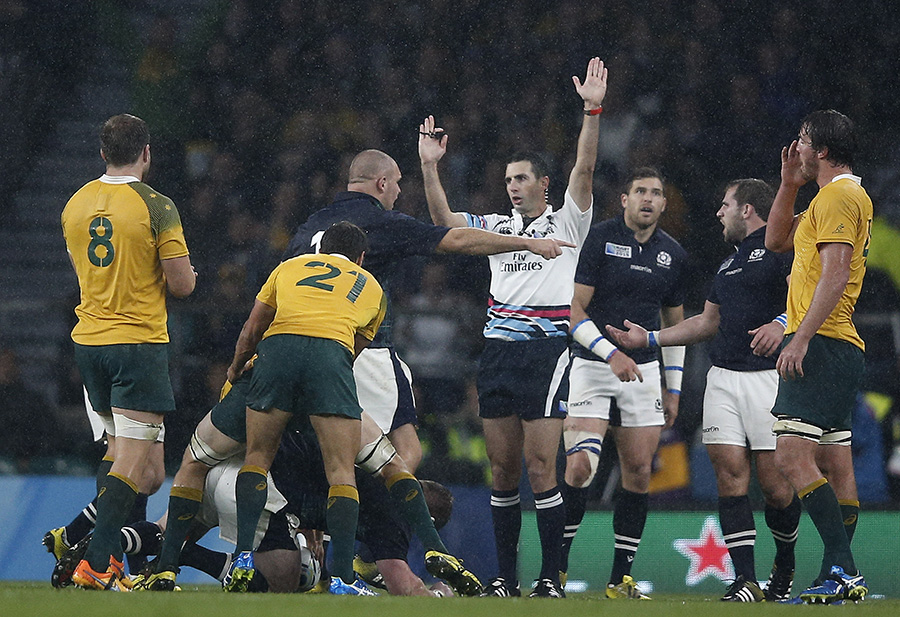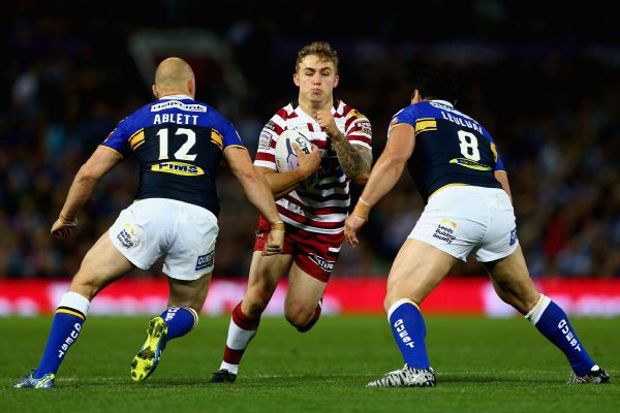|
Rugby World Cup
Don't blame Craig Joubert for Australia vs. Scotland blunder, blame rugby
Simon Barnes
October 20, 2015
World Cup organisers admit Joubert's Scotland error
Rugby union simply doesn't work as a high-stakes professional game. Craig Joubert made that quite clear last weekend. The sport was never designed as an activity on which fortunes and the reputations of nations depend. When you try and do so rugby's unsuitability is made devastatingly clear. Scotland were winning their semifinal against Australia in the final minute. But only by two points. And so, with delicious inevitability, Joubert gave Australia a penalty -- worth three points -- and they duly kicked it. Wrong decision. Bad mistake. Cue devastation. True, officiating errors happen in other sports; injustice is a fact of life for a professional athlete. But they happen more often in rugby union than in any other sport. How come the sport puts itself in a position in which wayward decisions are inevitable? The laws of rugby union are very complex, and ultimately they come down to subjective interpretation. The more violent the game, the greater the need for complex laws: violence must be channelled and controlled or the game becomes impossible. So why don't the equally violent games of rugby league and American football provide as many moments of controversy? The answer is simple: you can see what's going on. In both games it's hard to blindside the officials, either on purpose or by accident. The games are wide open to both officials and spectators.

Craig Joubert awards the match-deciding penalty © Getty Images
Enlarge
But much of rugby union is hidden. In the scrum and the maul -- concepts unique to rugby union -- up to 16 players are all bound up in the same bunch of tightly linked bodies, often all ending up on the floor together. Pundits talk about "the dark arts" involved in such passages of play; that's a euphemism for cheating. Or at least pushing the laws to the very limit. The truth is that nobody knows what's going on down there. Nobody can see. Nobody can adjudicate accurately: the thing is physically impossible. All you can do is the best you can, in the knowledge that you will always be some considerable way from perfection. It's genuinely impossible to officiate the sport of rugby union with consistency and fairness. Take the World Cup final of 2003. England had a great scrum that year: that is to say, the set-piece in which eight men crouch down to shove as a single entity against the same number of opposition. It was the source of much of their dominance in the tournament. But in the final, the referee Andre Watson decided the England scrum was actually illegal. So he took it on himself to reform it, and penalised England again and again, to their complete bafflement. This made for a thrillingly close match, but it took place on terms inconsistent with the rest of the competition. Hands up who understands why any penalty is given at a set scrum? No, me neither. And don't ask the players, they can't help you either. The officiating of the scrum has been criticised within the game: whose turn to be penalised this time? Shove! Collapse! Pheep! Must be a penalty in favour of the Big Boys. In rugby league and American football, the rule is that you retain the ball in the tackle. Play stops and then you start again with the ball. In rugby union play continues. You must release the ball and then compete for it. That's called "the breakdown". It's also a breakdown of law and order. No one can see with any certainty what's going on: and meanwhile players try and get away with everything they can. Naturally they push their luck as far as they can in these hidden areas of the game. All the stuff on the floor -- what Rudyard Kipling called "the many-legged heart of things" -- is impossible to police with consistency and clarity. It's a free-for-all punctuated by frequent -- and frequently subjective -- pheeps from the referee. Like last weekend. They keep tweaking the laws to make things easier and more available to objective interpretation, but they still haven't got there. They probably won't until they adopt the rugby league play-the-ball, in which the tackled player gets to his feet and pushes the ball between his legs to the man behind him. When they get there they will give the world a much easier game to referee -- though I might swerve it for a visit to the ice-caves of hell. I was given a really helpful book. It was called something like The Laws of Rugby Union Made Simple. Great, I thought. At last. Now I'll understand what's going on. And shall I tell you something? I didn't understand a line of it. Not one line. Just like everybody else.  In rugby league the rule is that you retain the ball in the tackle© Clive Brunskill/Getty Images The reason that more games of rugby union aren't decided by one dodgy decision is because rugby union, unlike association football, tends not to swing on a single incident. By and large, points reflect dominance and territory and few games are close. The unfairness tends to be subtle and cumulative. How did the sport get into such a state? Well, simple enough: first it got serious, then it went professional. Rugby union was never meant to be serious, and nor was any other game. Sport was designed as a recreation. It wasn't supposed to be your whole life: just a bit of it, say Saturday afternoon. Imperfections and unfairness didn't matter. Not much, anyway. Not by Sunday morning. The Victorian public schools loved sport because, it was believed, sport taught boys the manly virtues. They learned (a) to sink themselves into a common cause without seeking personal glory, a game for which rugby union is peculiarly suitable and (b) to accept authority -- in this case the authority of the referee -- without question, whether right or wrong. So the inconsistent and subjective interpretation of the laws was initially a good thing. It taught the boys to be cogs in the great imperial machine. So far so good -- or not -- but in 1995 the game became fully professional. Players no longer believe they have a duty to authority: in modern sporting morality, their first and last duty is to their team and to the pursuit of victory. They play for vast sums of money. The pride and glory of nations and the future lives of its participants are at stake. And that's too much for the rickety structure of the game to cope with in the 21st century. When you have a very close game in a high-profile match, the ancestral ingrained flaws of rugby union are going to make themselves clear. Joubert's error wasn't a one-off. It's part of the fabric of the game and as such it was inevitable, irrefragable and ineluctable. © ESPN Sports Media Ltd.
|
Live Sports
Communication error please reload the page.
-
Football
-
Cricket
-
Rugby
-
- Days
- Hrs
- Mins
- Secs
F1 - Abu Dhabi GP
Abu Dhabi Grand Prix December 11-131. Max Verstappen ()
2. Valtteri Bottas (Mercedes)
3. Lewis Hamilton (Mercedes)
4. Alexander Albon ()
5. Lando Norris ()
6. Carlos Sainz Jr ()
-
ESPNOtherLive >>
Golf - Houston Open
Snooker - China Open
Tennis - Miami Open

